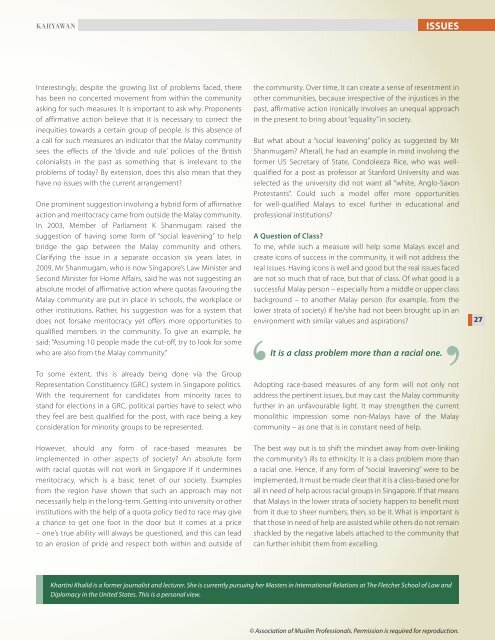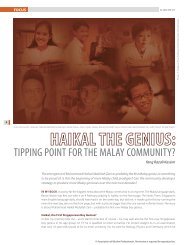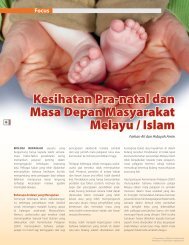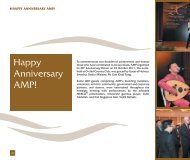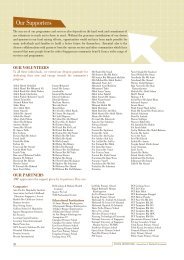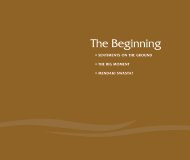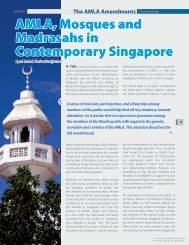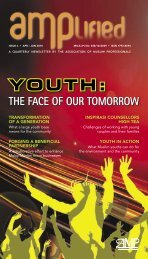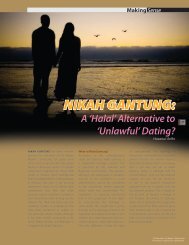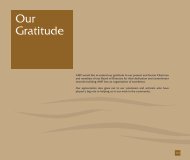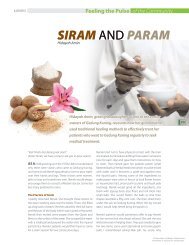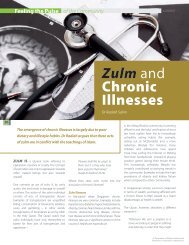community - Association of Muslim Professionals
community - Association of Muslim Professionals
community - Association of Muslim Professionals
You also want an ePaper? Increase the reach of your titles
YUMPU automatically turns print PDFs into web optimized ePapers that Google loves.
KARYAWAN<br />
ISSUES<br />
Interestingly, despite the growing list <strong>of</strong> problems faced, there<br />
has been no concerted movement from within the <strong>community</strong><br />
asking for such measures. It is important to ask why. Proponents<br />
<strong>of</strong> affirmative action believe that it is necessary to correct the<br />
inequities towards a certain group <strong>of</strong> people. Is this absence <strong>of</strong><br />
a call for such measures an indicator that the Malay <strong>community</strong><br />
sees the effects <strong>of</strong> the ‘divide and rule’ policies <strong>of</strong> the British<br />
colonialists in the past as something that is irrelevant to the<br />
problems <strong>of</strong> today? By extension, does this also mean that they<br />
have no issues with the current arrangement?<br />
One prominent suggestion involving a hybrid form <strong>of</strong> affirmative<br />
action and meritocracy came from outside the Malay <strong>community</strong>.<br />
In 2003, Member <strong>of</strong> Parliament K Shanmugam raised the<br />
suggestion <strong>of</strong> having some form <strong>of</strong> “social leavening” to help<br />
bridge the gap between the Malay <strong>community</strong> and others.<br />
Clarifying the issue in a separate occasion six years later, in<br />
2009, Mr Shanmugam, who is now Singapore’s Law Minister and<br />
Second Minister for Home Affairs, said he was not suggesting an<br />
absolute model <strong>of</strong> affirmative action where quotas favouring the<br />
Malay <strong>community</strong> are put in place in schools, the workplace or<br />
other institutions. Rather, his suggestion was for a system that<br />
does not forsake meritocracy yet <strong>of</strong>fers more opportunities to<br />
qualified members in the <strong>community</strong>. To give an example, he<br />
said: “Assuming 10 people made the cut-<strong>of</strong>f, try to look for some<br />
who are also from the Malay <strong>community</strong>.”<br />
the <strong>community</strong>. Over time, it can create a sense <strong>of</strong> resentment in<br />
other communities, because irrespective <strong>of</strong> the injustices in the<br />
past, affirmative action ironically involves an unequal approach<br />
in the present to bring about “equality” in society.<br />
But what about a “social leavening” policy as suggested by Mr<br />
Shanmugam? Afterall, he had an example in mind involving the<br />
former US Secretary <strong>of</strong> State, Condoleeza Rice, who was wellqualified<br />
for a post as pr<strong>of</strong>essor at Stanford University and was<br />
selected as the university did not want all “white, Anglo-Saxon<br />
Protestants”. Could such a model <strong>of</strong>fer more opportunities<br />
for well-qualified Malays to excel further in educational and<br />
pr<strong>of</strong>essional institutions?<br />
A Question <strong>of</strong> Class?<br />
To me, while such a measure will help some Malays excel and<br />
create icons <strong>of</strong> success in the <strong>community</strong>, it will not address the<br />
real issues. Having icons is well and good but the real issues faced<br />
are not so much that <strong>of</strong> race, but that <strong>of</strong> class. Of what good is a<br />
successful Malay person – especially from a middle or upper class<br />
background – to another Malay person (for example, from the<br />
lower strata <strong>of</strong> society) if he/she had not been brought up in an<br />
environment with similar values and aspirations?<br />
It is a class problem more than a racial one.<br />
27<br />
To some extent, this is already being done via the Group<br />
Representation Constituency (GRC) system in Singapore politics.<br />
With the requirement for candidates from minority races to<br />
stand for elections in a GRC, political parties have to select who<br />
they feel are best qualified for the post, with race being a key<br />
consideration for minority groups to be represented.<br />
However, should any form <strong>of</strong> race-based measures be<br />
implemented in other aspects <strong>of</strong> society? An absolute form<br />
with racial quotas will not work in Singapore if it undermines<br />
meritocracy, which is a basic tenet <strong>of</strong> our society. Examples<br />
from the region have shown that such an approach may not<br />
necessarily help in the long-term. Getting into university or other<br />
institutions with the help <strong>of</strong> a quota policy tied to race may give<br />
a chance to get one foot in the door but it comes at a price<br />
– one’s true ability will always be questioned, and this can lead<br />
to an erosion <strong>of</strong> pride and respect both within and outside <strong>of</strong><br />
Adopting race-based measures <strong>of</strong> any form will not only not<br />
address the pertinent issues, but may cast the Malay <strong>community</strong><br />
further in an unfavourable light. It may strengthen the current<br />
monolithic impression some non-Malays have <strong>of</strong> the Malay<br />
<strong>community</strong> – as one that is in constant need <strong>of</strong> help.<br />
The best way out is to shift the mindset away from over-linking<br />
the <strong>community</strong>’s ills to ethnicity. It is a class problem more than<br />
a racial one. Hence, if any form <strong>of</strong> “social leavening” were to be<br />
implemented, it must be made clear that it is a class-based one for<br />
all in need <strong>of</strong> help across racial groups in Singapore. If that means<br />
that Malays in the lower strata <strong>of</strong> society happen to benefit most<br />
from it due to sheer numbers, then, so be it. What is important is<br />
that those in need <strong>of</strong> help are assisted while others do not remain<br />
shackled by the negative labels attached to the <strong>community</strong> that<br />
can further inhibit them from excelling.<br />
Khartini Khalid is a former journalist and lecturer. She is currently pursuing her Masters in International Relations at The Fletcher School <strong>of</strong> Law and<br />
Diplomacy in the United States. This is a personal view.<br />
© <strong>Association</strong> <strong>of</strong> <strong>Muslim</strong> Pr<strong>of</strong>essionals. Permission is required for reproduction.


